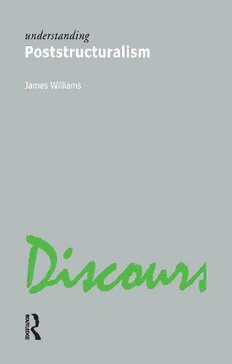Table Of Contentunderstanding poststructuralism
Understanding Movements in Modern Thought
Series Editor: Jack Reynolds
Th is series provides short, accessible and lively introductions to the
major schools, movements and traditions in philosophy and the h istory
of ideas since the beginning of the Enlightenment. All books in the
series are written for undergraduates meeting the subject for the fi rst
time.
Published
Understanding Existentialism Understanding Virtue Ethics
Jack Reynolds Stan van Hooft
Understanding Poststructuralism
James Williams
Forthcoming titles include
Understanding Empiricism Understanding Hermeneutics
Robert Meyers Lawrence Schmidt
Understanding Ethics Understanding Naturalism
Tim Chappell Jack Ritchie
Understanding Feminism Understanding Phenomenology
Peta Bowden and Jane Mummery David Cerbone
Understanding German Idealism Understanding Rationalism
Will Dudley Charlie Heunemann
Understanding Hegelianism Understanding Utilitarianism
Robert Sinnerbrink Tim Mulgan
understanding poststructuralism
James Williams
For Richard and Olive
It is always about who you learn from.
First published in 2005 by Acumen
Published 2014 by Routledge
2 Park Square, Milton Park, Abingdon, Oxon OX14 4RN
711 Third Avenue, New York, NY 10017, USA
Routledge is an imprint of the Taylor & Francis Group,
an informa business
© James Williams, 2005
Th is book is copyright under the Berne Convention.
No reproduction without permission.
All rights reserved. No part of this book may be reprinted or
reproduced or utilised in any form or by any electronic, mechanical,
or other means, now known or hereafter invented, including
photocopying and recording, or in any information storage or
retrieval system, without permission in writing from the publishers.
Notices
Practitioners and researchers must always rely on their own
experience and knowledge in evaluating and using any information,
methods, compounds, or experiments described herein. In using such
information or methods they should be mindful of their own
safety and the safety of others, including parties for whom they have
a professional responsibility.
To the fullest extent of the law, neither the Publisher nor the
authors, contributors, or editors, assume any liability for any injury
and/or damage to persons or property as a matter of products
liability, negligence or otherwise, or from any use or operation of
any methods, products, instructions, or ideas contained in the
material herein.
ISBN 13: 978-1-84465-032-3 (hbk)
ISBN 13: 978-1-84465-033-0 (pbk)
Work on Chapter 3 was supported by
British Library Cataloguing-in-Publication Data
A catalogue record for this book is available from the British Library.
Designed and typeset in Garamond by Kate Williams, Swansea.
Contents
Acknowledgements vii
Abbreviations ix
1 Introduction: What is poststructuralism? 1
2 Poststructuralism as deconstruction: 25
Jacques Derrida’s Of Grammatology
3 Poststructuralism as philosophy of diff erence: 53
Gilles Deleuze’s Diff erence and Repetition
4 Poststructuralism as philosophy of the event: 79
Lyotard’s Discours, fi gure
5 Poststructuralism, history, genealogy: 105
Michel Foucault’s Th e Archaeology of Knowledge
6 Poststructuralism, psychoanalysis, linguistics: 133
Julia Kristeva’s Revolution in Poetic Language
7 Poststructuralism into the future 153
Questions for discussion and revision 167
Further reading 171
Publications timeline 174
Index 177
contents v
This page intentionally left blank
Acknowledgements
I should like to thank Th e Carnegie Trust for the Universities of Scotland
for its generous funding for research in Paris libraries. La Bibliothèque
du Saulchoir, Paris, provided a stimulating research environment and a
wonderful research resource. Work on Chapter 3 was supported by the
Arts and Humanities Research Council. Material from Chapter 3 was
presented at the Experimenting with Intensities Conference (May 2004)
at Trent University, Canada, with travel funded by the British Acad-
emy, and at the Writing/History: Deleuzian Events Conference (June
2005) at the University of Cologne. Chapter 4 was presented in part
at the Department of Political Science, Carleton University, Canada.
I am grateful for their support and very useful feedback. Chapter 1
was presented at the Graduate Visiting Speaker Series, Department of
E nglish Literature, University of Edinburgh. Parts of this book were
also presented at the Research Seminar in the Philosophy Department,
University of Dundee. Th e University of Dundee funded sabbatical
leave for this project. Kurt Brandhorst, Claire Colebrook, Nicholas
Davey, John Drummond, Penny Fielding, Lily Forrester, Rachel Jones,
Beth Lord, Valentine Moulard, Aislinn O’Donnell, Keith Ansell Pear-
son, John Protevi, Dan Smith, Michael Wheeler, Frédéric Worms and
many others challenged and helped me in conversations and through
their research. At Acumen Steven Gerrard, Tristan Palmer and Kate
Williams made this a much better book through their careful editorial
advice. My undergraduate and postgraduate classes and tutees gave me
the opportunity to try out many parts of this work in a sympathetic but
critical environment. Th ey prompted ideas in ways that can never be
acknowledgements vii
traced fully, but that are the lifeblood of academic work. I am grateful
to all friends, students and colleagues for their comments and help, but
claim all errors and imprecision as mine all mine.
A work owes more than could ever be quantifi ed to the time, love and
spaces that others make for it, should anyone be foolish or crude enough
to try. In all of these, my immeasurable debts are to you, Claire.
viii understanding poststructuralism
Abbreviations
AK Foucault, Th e Archaeology of Knowledge (London: Routledge,
1989).
D Derrida, “Diff érance”, in Margins of Philosophy, A. Bass (trans.),
1–28 (Chicago, IL: University of Chicago Press, 1984).
DR Deleuze, Diff erence and Repetition, P. Patton (trans.) (New York:
Columbia University Press, 1995).
DF Lyotard, Discours, fi gure (Paris: Klincksieck, 1971).
HRS Deleuze, “How do we Recognize Structuralism”, in Desert Islands
and Other Texts (1953–1974), M. Taormina (trans.), 170–92
(New York: Semiotext(e), 2003).
OG Derrida, Of Grammatology, G. C. Spivak (trans.) (Baltimore,
MD: Johns Hopkins University Press, 1974).
PS Deleuze, Proust and Signs, R. Howard (trans.) (London: Con-
tinuum, 2000).
RPL Kristeva, Revolution in Poetic Language, M. Waller (trans.) (New
York: Columbia University Press, 1984).
TD Lyotard, Th e Diff erend: Phrases in Dispute (Minneapolis, MN:
University of Minnesota Press, 1988).
WPU Deleuze, “What Prisoners want from Us”, in Desert Islands and
Other Texts (1953–1974), M. Taormina (trans.), 204–5 (New
York: Semiotext(e), 2003).
abbreviations ix

